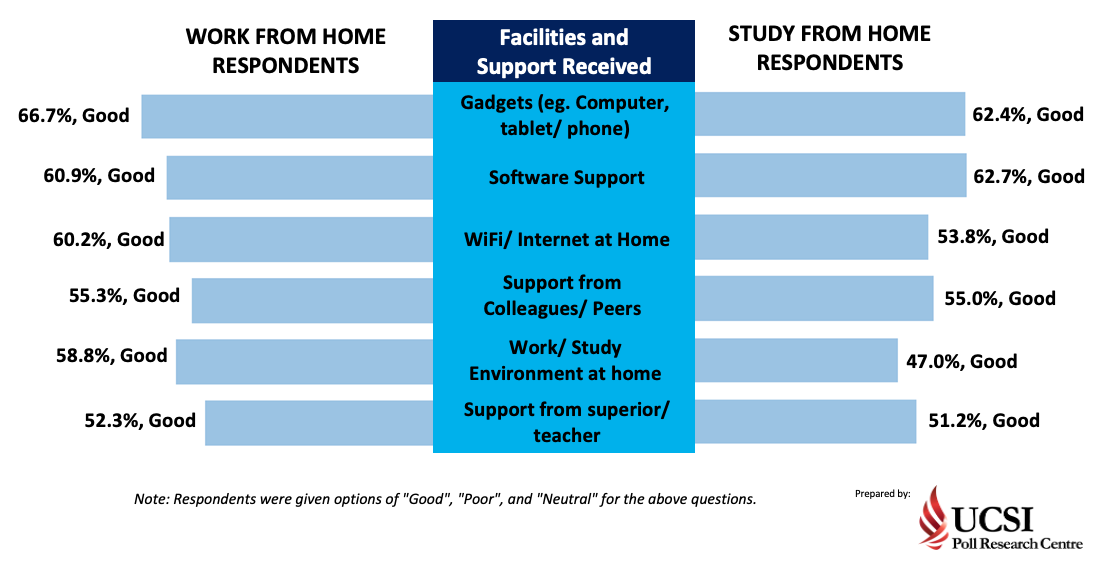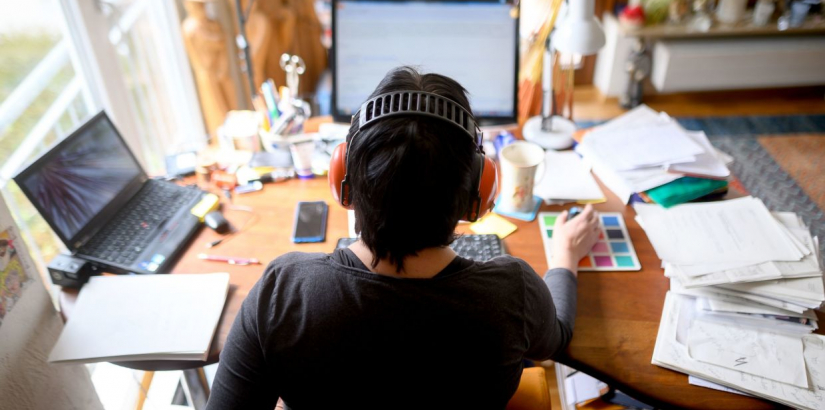
Poll Results
KUALA LUMPUR, 31 MAY 2021 – In the effort to curb the spread of Covid-19, the government has repeatedly called for certain sectors to work from home. The call to work from home extends to education. However, this call has led to one question: Is it possible for all sectors to work from home?
The UCSI Poll Research Centre conducted a survey with 945 respondents on the topic ‘from home’ and the margin of error of the survey was +-3%. The respondents consisted of two categories of work from home which was 47.3% and study from home which was 52.7%.
The respondents were asked for their opinions on the facilities and support received, productivity, balanced life and stress levels.

The survey showed that respondents generally gave positive feedback on the facilities and support received when working and studying from home. This is encouraging as the “from home” mode is more mature and ready which includes gadgets, software support, WiFi/ Internet, support from peers, colleagues, supervisors, and teachers.
Interestingly, the survey showed that respondents with work from home experience and study from home have opposite opinions on a few aspects. These include the agreement on productivity, life balance, and stress levels.
When asked about the productivity during ‘from home’ practice, the respondents with work from home experience showed that 42.5% of them chose higher productivity, 34.9% of respondents chose lower productivity, and 22.6% of the respondents chose no difference. The respondents with study from home experience showed that 52.8% of them chose lower productivity, 26.9% of the respondents chose higher productivity, and 20.3% of the respondents chose no difference.
When asked about life balance during ‘from home’ practice, the respondents with work from home experience showed that 52.6% of them chose YES, 33.8% of the respondents chose NO, and 13.6% the respondents chose no difference. The respondents with study from home experience showed that 50.8% of them chose NO, 33.1% of the respondents chose YES, and 16.1% of the respondents chose no difference.
When asked about stress levels during ‘from home’ practice, the respondents with work from home experience showed that 43.6% of them chose lower stress levels, 34.9% of the respondents chose higher stress levels, and 21.5% the respondents chose no difference. The respondents with study from home experience showed that 51.8% of them chose higher stress levels, 30.5% of the respondents chose lower stress levels, and 17.7% of the respondents chose no difference.
The youth who study from home experience the lack of social interaction through online learning modes which may be one of the reasons that they did not feel productive, had higher stress levels, and have imbalanced lives. Online learning in Malaysia has been practised for a year since 2020, and the learning mode may continue longer in view of the high rise of cases. A review on the online teaching method by educators and self-reflection by students are important to improve and tackle the effectiveness on online learning.
‘From home’ is a new normal and most people are starting to adapt to this. However, the psychological factors of ‘from home’ practice should be considered as well aside from productivity.
About UCSI Poll Research Centre The UCSI Poll Research Centre (UCSI-PRC) is a public opinion research company owned by the UCSI Group. Its main objective is to utilise original and scientific research methodologies to investigate and analyse public opinions and attitudes.



